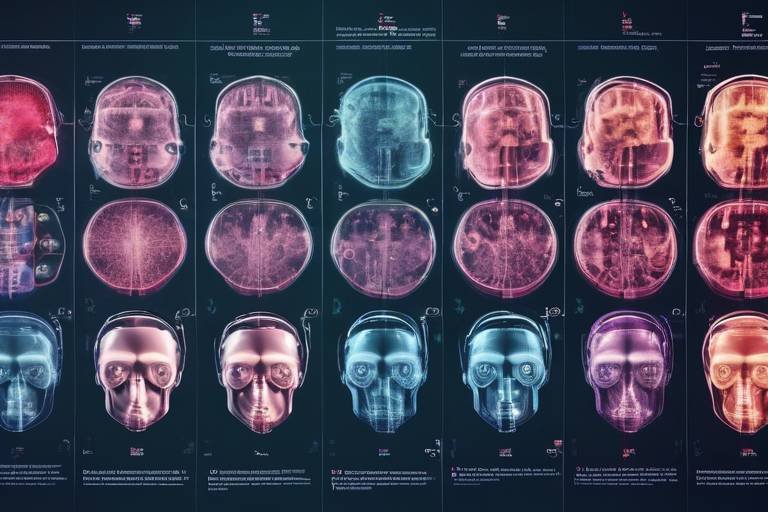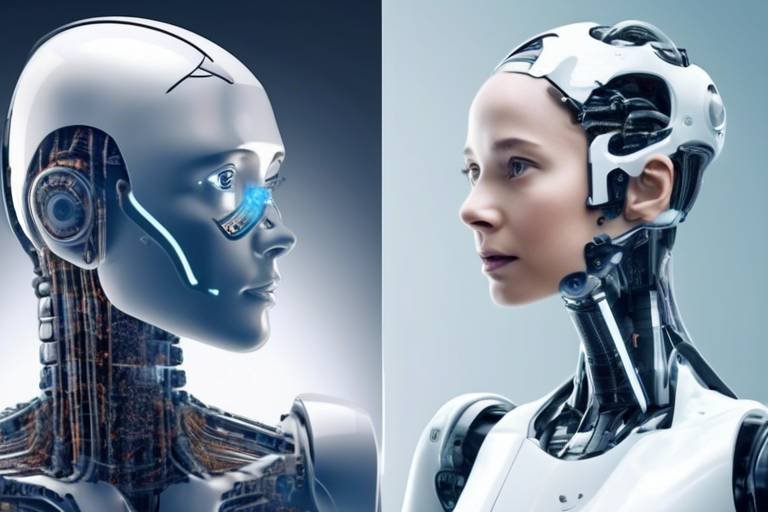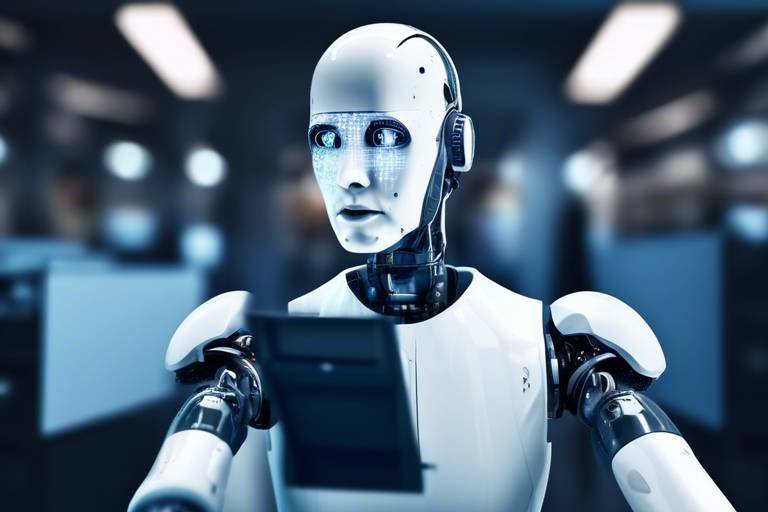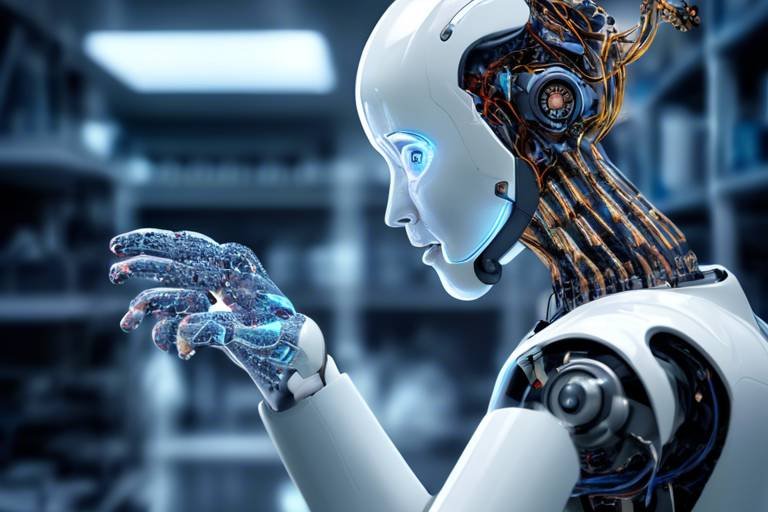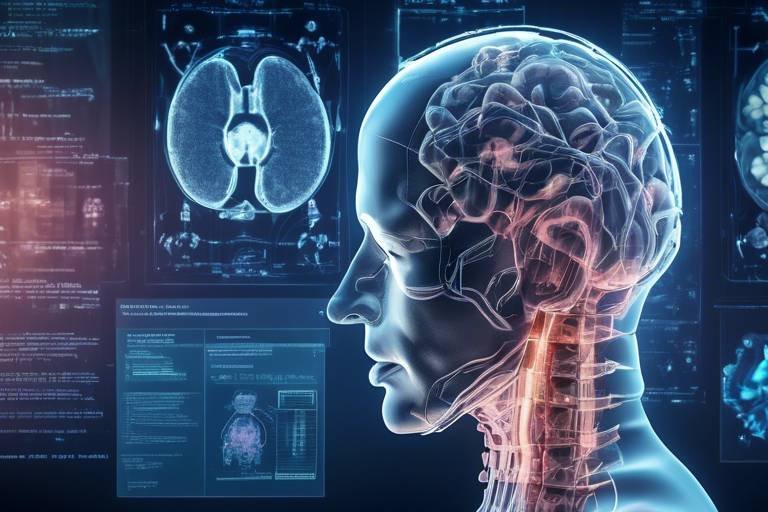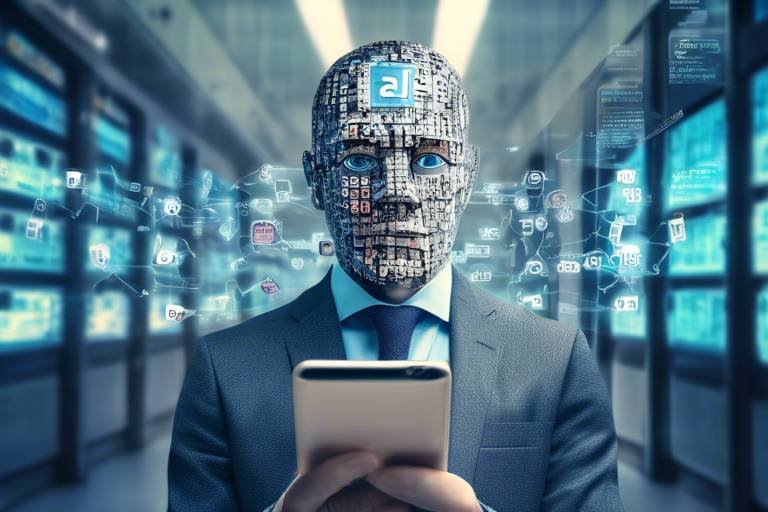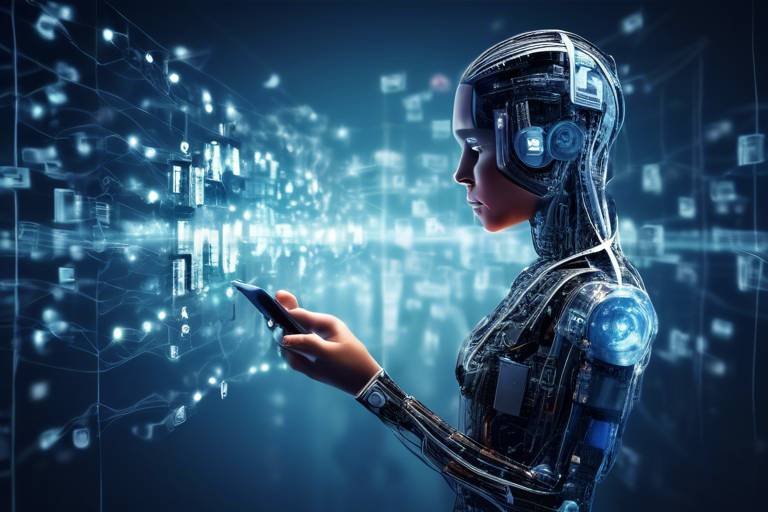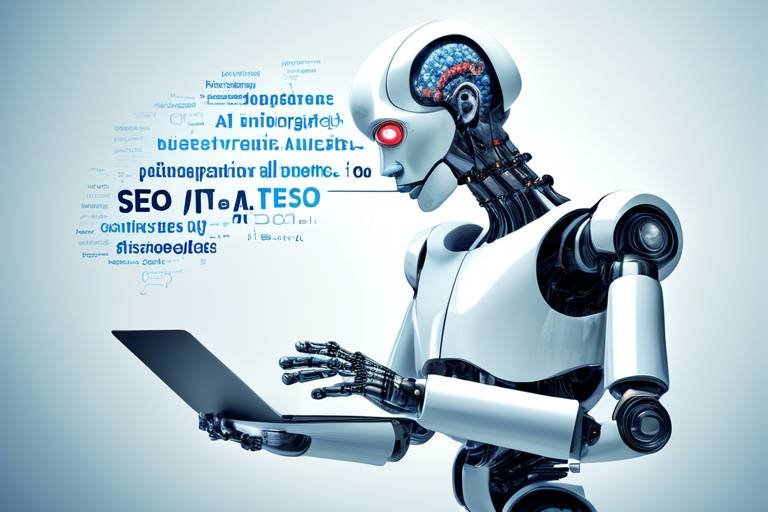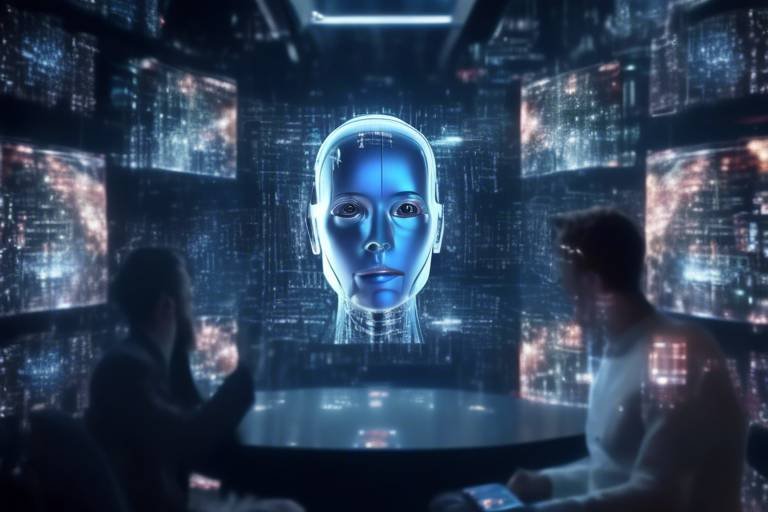Artificial Intelligence and the Influence of AI on Job Market
Artificial Intelligence (AI) is no longer just a futuristic concept; it has become a transformative force reshaping the job market in ways we couldn't have imagined just a decade ago. As we delve into this fascinating topic, it’s crucial to understand that AI is not merely replacing jobs but is also creating new opportunities. The influence of AI spans across various industries, affecting employment opportunities, skill requirements, and the overall future of work. Have you ever wondered how a machine can outperform a human in specific tasks? Or how AI can enhance productivity while simultaneously changing the nature of jobs? In this article, we will explore these questions and more, revealing the intricate dance between technology and employment.
The evolution of AI technologies has been nothing short of remarkable. From simple algorithms to sophisticated neural networks, the journey of AI has been marked by significant advancements. These innovations are being integrated into various sectors, including healthcare, finance, and manufacturing, driving a wave of change in the job market. For instance, the introduction of machine learning has enabled systems to learn from data and improve over time, leading to enhanced decision-making processes. As AI continues to evolve, it brings with it a plethora of opportunities and challenges that we must navigate carefully.
As AI technologies proliferate, they are transforming employment opportunities across the globe. While some positions are becoming obsolete, new roles are emerging, painting a complex picture of the job landscape. The question arises: are we ready to embrace these changes? The answer lies in understanding which jobs are at risk and which are on the rise. For example, roles in data analysis, machine learning, and AI ethics are gaining traction, while routine jobs that can be automated are becoming less common. This shift necessitates a reevaluation of our skills and how we approach our careers.
AI is not just a job killer; it's also a job creator. Emerging industries are springing up, fueled by AI advancements. Let’s take a closer look at some of these sectors:
- Healthcare: AI is revolutionizing patient care, diagnostics, and telemedicine, leading to new positions such as AI healthcare specialists.
- Finance: Roles in algorithmic trading and fraud detection are on the rise, as financial institutions leverage AI to enhance their operations.
- Manufacturing: Automation and robotics are creating demand for technicians who can maintain and oversee AI-powered machinery.
The healthcare sector is experiencing a profound transformation due to AI technologies. With the rise of telemedicine, AI is enabling healthcare professionals to reach patients remotely, enhancing accessibility and efficiency. Additionally, AI-driven diagnostics are improving accuracy in detecting diseases, leading to better patient outcomes. New roles are emerging in this field, such as data analysts who specialize in healthcare data, and AI ethicists who ensure that AI applications align with ethical standards.
In the finance industry, AI is reshaping how we manage risk and detect fraud. With algorithmic trading, AI systems can analyze vast amounts of data in real-time, making split-second decisions that human traders cannot match. This has led to a demand for professionals skilled in AI technologies, such as data scientists and AI compliance officers, who ensure that AI applications adhere to regulatory standards.
While AI brings numerous benefits, it also poses a significant challenge: job displacement. Automation is rendering certain positions obsolete, particularly those involving repetitive tasks. Sectors like manufacturing and customer service are most at risk. However, this does not mean that the workforce is doomed; rather, it indicates a need for adaptation and evolution. The key lies in understanding which roles are at risk and how to pivot towards emerging opportunities.
As we navigate this AI-influenced job market, it's essential to focus on the skills that will be in demand. Adaptability and continuous learning have become crucial. Workers must be prepared to upskill and reskill to remain competitive. This means investing time in learning both technical skills, like programming and data analysis, and soft skills, such as critical thinking and emotional intelligence. The balance between these skill sets will define the future workforce.
In the age of AI, technical skills are undeniably important, but they must be complemented by strong soft skills. Employers are increasingly seeking individuals who can not only navigate complex data but also communicate effectively, work in teams, and lead with empathy. The combination of these skills will create a workforce that is not only efficient but also resilient in the face of change.
Ongoing education and training programs are vital for helping workers adapt to the evolving demands of the job market. Organizations must prioritize reskilling initiatives to prepare their employees for new roles that AI technologies will create. This commitment to learning will not only benefit the workforce but also enhance organizational adaptability and innovation.
Educational institutions play a crucial role in preparing the next generation for a future where AI is ubiquitous. By adapting curricula to include AI-related topics, schools and universities can equip students with the knowledge and skills they need to thrive. This proactive approach will ensure that graduates are ready to enter a job market that is increasingly influenced by AI technologies.
Schools and universities are beginning to incorporate AI-related subjects into their programs. This includes courses on machine learning, data ethics, and AI programming. By providing students with hands-on experience and practical knowledge, educational institutions are fostering a workforce that is well-prepared for the challenges and opportunities that AI presents.
Partnerships between educational institutions and industries are essential for ensuring that training programs meet the needs of the job market. By collaborating with businesses, schools can develop curricula that reflect real-world demands, creating a seamless transition from education to employment. This synergy will help cultivate a workforce ready to tackle the challenges of an AI-driven economy.
Q: Will AI take away all jobs?
A: While AI may displace certain jobs, it is also creating new opportunities. The key is to adapt and learn new skills.
Q: What skills should I focus on to thrive in an AI-influenced job market?
A: Focus on a combination of technical skills like programming and soft skills like communication and critical thinking.
Q: How can educational institutions prepare students for AI careers?
A: By integrating AI topics into curricula and collaborating with industries to align training with market needs.

The Rise of AI Technologies
Artificial Intelligence (AI) has come a long way since its inception, transforming from a theoretical concept into a vital component of modern technology. The rise of AI technologies has been marked by rapid advancements in machine learning, natural language processing, and robotics, fundamentally altering how we interact with machines and each other. As we embrace this digital revolution, it’s essential to recognize the key milestones that have paved the way for AI's integration into various sectors.
Initially, AI was limited to simple algorithms and rule-based systems. However, with the advent of big data and enhanced computational power, AI has evolved into sophisticated systems capable of learning from vast amounts of information. For instance, deep learning, a subset of machine learning, has enabled computers to recognize patterns and make decisions with remarkable accuracy. This leap in technology has opened up a world of possibilities across industries, including healthcare, finance, and entertainment.
Moreover, the integration of AI technologies is not just a trend; it’s a necessity for businesses aiming to remain competitive in today’s fast-paced market. Companies are leveraging AI to improve operational efficiency, enhance customer experiences, and drive innovation. For example, AI-driven chatbots are revolutionizing customer service by providing instant responses to inquiries, thus freeing human agents to handle more complex issues. This shift is not only improving customer satisfaction but also reshaping the workforce landscape.
As AI continues to advance, we are witnessing the emergence of new technologies that are further driving its adoption. Some of the most notable advancements include:
- Natural Language Processing (NLP): This technology enables machines to understand and interpret human language, facilitating more intuitive interactions.
- Computer Vision: AI systems can now analyze and interpret visual data, leading to innovations in areas such as autonomous vehicles and surveillance.
- Robotics: Advanced robotics powered by AI are enhancing manufacturing processes, logistics, and even personal assistance.
The impact of these technologies is profound, not only enhancing productivity but also creating new avenues for job creation and altering traditional roles. As industries adapt to these innovations, the demand for skilled professionals who can navigate this AI-driven landscape is skyrocketing. It’s a thrilling time to be involved in technology, but it also poses challenges as workers must evolve alongside these advancements.
In summary, the rise of AI technologies marks a pivotal moment in our history, one that promises to reshape the job market and redefine how we work and live. Embracing these changes will require both individuals and organizations to be proactive in adapting to the new reality, ensuring that they are not left behind in this technological wave.

Impact on Employment Opportunities
The advent of artificial intelligence (AI) is not just a buzzword; it’s a transformative force that is reshaping employment opportunities across the globe. As AI technologies advance, they are creating a paradox in the job market: while some jobs are becoming obsolete, new roles are emerging that require a different set of skills. This evolution is akin to a double-edged sword, cutting through traditional employment roles while simultaneously carving out pathways for innovation and growth.
To understand this impact, we must first acknowledge that AI is not merely replacing jobs; it is also redefining them. For instance, mundane tasks that once required human effort are now being automated, allowing professionals to focus on more complex and creative aspects of their roles. This shift is particularly evident in industries such as manufacturing and customer service, where AI-driven tools enhance productivity and efficiency. However, it raises a critical question: what happens to the workers whose roles are diminished or eliminated?
As we delve deeper into the job market influenced by AI, we can categorize the impact into two primary areas: job creation and job displacement. On one hand, AI is fostering the growth of entirely new industries and job roles. On the other hand, it poses a significant threat to positions heavily reliant on routine tasks. To illustrate this dynamic, consider the following table that highlights sectors experiencing both job creation and displacement:
| Sector | Job Creation | Job Displacement |
|---|---|---|
| Healthcare | Telemedicine specialists, AI healthcare analysts | Administrative roles, traditional diagnostics |
| Finance | Data analysts, algorithmic traders | Bank tellers, manual auditors |
| Manufacturing | Robotics technicians, AI system managers | Assembly line workers, quality control inspectors |
From this table, it's clear that while **AI is generating exciting new opportunities**, it simultaneously threatens to displace workers in roles that are easily automated. The challenge for the workforce lies in navigating this transition. Workers must be prepared to pivot and adapt to the changing landscape, which requires a commitment to continuous learning and skill development.
Moreover, the impact of AI on employment opportunities is not uniform across all demographics. Certain groups, such as those with limited access to education or training, may find themselves disproportionately affected by job displacement. This raises an important point about equity in the workforce and the need for inclusive strategies that ensure all workers can benefit from the opportunities AI presents.
In conclusion, the influence of AI on employment opportunities is profound and multifaceted. As we move forward, it is crucial for both individuals and organizations to embrace adaptability and innovation. The job market is evolving at a rapid pace, and those who are willing to learn and grow will find themselves at the forefront of this exciting new era.
- Will AI take away all jobs? While AI will automate certain tasks, it will also create new jobs that require human skills and creativity.
- What skills will be most important in an AI-driven job market? Skills such as critical thinking, emotional intelligence, and technical proficiency will be crucial for future employment.
- How can workers prepare for the changes brought by AI? Continuous learning, reskilling, and upskilling will be essential for adapting to new job requirements.
- Are there specific industries more affected by AI? Yes, sectors like healthcare, finance, and manufacturing are experiencing significant changes due to AI integration.

Job Creation in AI-Driven Industries
As we dive into the world of artificial intelligence, it's crucial to recognize the **transformative power** it holds over various industries. While many fear that AI will lead to job losses, the reality is that it is also a catalyst for **job creation** in numerous sectors. In fact, AI is not just a tool for efficiency; it’s a spark igniting new opportunities that didn’t exist a decade ago. For instance, the demand for AI specialists, data scientists, and machine learning engineers has skyrocketed, reshaping the workforce landscape.
One of the most significant areas experiencing growth is the **healthcare sector**. AI technologies are revolutionizing patient care, diagnostics, and even administrative tasks. Roles such as telehealth coordinators and AI-assisted diagnostic specialists are emerging, where professionals leverage AI tools to enhance patient outcomes. Imagine a world where a doctor can analyze vast amounts of data in seconds, pinpointing potential health issues before they become critical. This not only improves efficiency but also creates a **demand for skilled workers** who can manage and interpret this data.
Similarly, the **finance industry** is undergoing a seismic shift thanks to AI. Traditional roles are evolving, and new positions are being created in areas like algorithmic trading and risk assessment. As financial institutions adopt AI to predict market trends and detect fraud, they need professionals who understand both finance and technology. The blend of these skills is becoming increasingly valuable, leading to a surge in job opportunities for those willing to adapt. Here’s a snapshot of some job roles emerging in AI-driven industries:
| Industry | Emerging Job Roles |
|---|---|
| Healthcare | Telehealth Coordinators, AI Diagnostic Specialists, Health Data Analysts |
| Finance | Algorithmic Traders, Risk Analysts, Fraud Detection Specialists |
| Retail | AI Customer Experience Managers, Inventory Optimization Analysts |
| Manufacturing | Automation Engineers, Predictive Maintenance Technicians |
Moreover, the **retail industry** is also embracing AI, creating job roles focused on enhancing customer experiences through personalized shopping. With the advent of AI-driven analytics, retailers require specialists who can interpret consumer data to optimize inventory and tailor marketing strategies. This shift not only creates jobs but also transforms the way businesses interact with their customers, paving the way for a more engaging shopping experience.
In conclusion, while it’s easy to focus on the potential downsides of AI, it’s essential to highlight the **opportunities** it brings. The job market is evolving, and with it comes the need for a workforce that is adaptable and ready to embrace change. As industries continue to integrate AI into their operations, the demand for skilled professionals will only increase, making it a thrilling time to be part of the workforce.
- Will AI really create more jobs than it displaces? Many experts believe that while AI may automate certain tasks, it will also create new roles that require human oversight and creativity.
- What skills should I develop to work in AI-driven industries? Focus on both technical skills, like programming and data analysis, as well as soft skills such as problem-solving and communication.
- How can I prepare for a career in an AI-driven job market? Continuous learning through online courses, workshops, and real-world experience can help you stay relevant in this evolving landscape.

AI in Healthcare
Artificial Intelligence is revolutionizing the healthcare sector in ways that were once confined to the realm of science fiction. Imagine a world where doctors are assisted by intelligent systems that can analyze patient data in real-time, predict potential health issues, and suggest personalized treatment plans. This is not just a dream; it's happening right now! AI technologies are being integrated into various aspects of healthcare, leading to enhanced patient care, improved diagnostic accuracy, and more efficient operations.
One of the most significant advancements in AI is its application in telemedicine. With the rise of remote consultations, AI-powered platforms are facilitating virtual visits, allowing patients to receive care from the comfort of their homes. These platforms can analyze symptoms, recommend specialists, and even schedule appointments, making healthcare more accessible than ever. Furthermore, AI algorithms can sift through vast amounts of data to identify patterns in patient health records, enabling healthcare providers to make informed decisions quickly.
Another exciting area where AI is making waves is in diagnostics. Traditional diagnostic methods can be time-consuming and prone to human error. However, AI systems can analyze medical imaging—such as X-rays, MRIs, and CT scans—at lightning speed, often with greater accuracy than human radiologists. For example, studies have shown that AI can detect certain cancers earlier than conventional methods, which can significantly improve patient outcomes. This capability not only saves lives but also reduces the burden on healthcare professionals, allowing them to focus on more complex cases.
In the realm of patient care management, AI is streamlining processes that were once tedious and labor-intensive. For instance, AI-driven chatbots can handle routine inquiries, follow-ups, and medication reminders, freeing up healthcare staff to dedicate more time to patient interaction. This not only enhances the patient experience but also improves the efficiency of healthcare delivery. Additionally, AI can help in predicting patient admissions and optimizing resource allocation, ensuring that hospitals can respond effectively to fluctuating demands.
However, as we embrace these technological advancements, it’s crucial to address the ethical implications and ensure that AI is used responsibly in healthcare settings. Privacy concerns regarding patient data and the need for transparent algorithms are topics that require ongoing dialogue among stakeholders. Nonetheless, the potential benefits of AI in healthcare are immense, paving the way for a future where healthcare is not only more efficient but also more personalized.
As we look ahead, it's clear that AI will play a pivotal role in shaping the future of healthcare. By enhancing diagnostic capabilities, improving patient engagement, and streamlining operations, AI is not just a tool but a transformative force that can lead to better health outcomes for all.
- How is AI used in healthcare? AI is used in various ways, including diagnostics, telemedicine, patient care management, and predictive analytics.
- What are the benefits of AI in healthcare? Benefits include improved diagnostic accuracy, enhanced patient engagement, and increased efficiency in healthcare delivery.
- Are there any risks associated with AI in healthcare? Yes, risks include privacy concerns, potential biases in algorithms, and the need for transparent decision-making processes.
- Will AI replace healthcare professionals? While AI can assist in many tasks, it is not likely to replace healthcare professionals but rather augment their capabilities.

AI in Finance
Artificial Intelligence is revolutionizing the finance industry, transforming how financial institutions operate and deliver services. From algorithmic trading to risk assessment, AI technologies are reshaping traditional processes, enhancing efficiency, and providing deeper insights into market trends. Imagine a world where financial analysts rely not just on their instincts but on sophisticated algorithms that can predict market movements with astonishing accuracy. This shift is not just a trend; it's a fundamental change in how finance professionals approach their work.
One of the most significant applications of AI in finance is in algorithmic trading. This involves using complex algorithms to execute trades at speeds and frequencies that are impossible for human traders. These algorithms analyze vast amounts of data in real-time, allowing firms to capitalize on market inefficiencies almost instantaneously. For instance, hedge funds are now employing AI to analyze news articles, social media sentiment, and even economic indicators to make informed trading decisions. The result? Increased profitability and reduced risk.
Moreover, AI is playing a critical role in risk assessment. Financial institutions are leveraging machine learning models to assess credit risk more accurately. Traditional credit scoring methods often rely on static data, which can lead to biases and inaccuracies. In contrast, AI can analyze a broader range of data points, including transaction history and behavioral patterns, to generate a more comprehensive risk profile. This not only helps banks make better lending decisions but also opens up opportunities for individuals who may have been overlooked by conventional assessment methods.
Fraud detection is another crucial area where AI shines. With the rise of digital banking and online transactions, the potential for fraud has increased exponentially. Financial institutions are now employing AI-driven systems that can detect unusual patterns and flag potentially fraudulent activities in real-time. For example, if a customer's account suddenly shows a transaction in a foreign country that doesn't align with their typical spending habits, AI algorithms can alert the bank and the customer immediately, preventing potential losses.
To illustrate the impact of AI in finance, consider the following table that highlights some key areas of transformation:
| Application | Description | Benefits |
|---|---|---|
| Algorithmic Trading | Using algorithms to execute trades based on data analysis. | Higher speed, improved accuracy, and increased profitability. |
| Risk Assessment | Machine learning models to evaluate credit risk. | More accurate assessments, reduced bias, and better lending opportunities. |
| Fraud Detection | AI systems to identify and prevent fraudulent transactions. | Real-time alerts, reduced losses, and enhanced security. |
As we look to the future, it's clear that the role of AI in finance will continue to expand. Financial professionals must adapt to this new landscape, embracing technology as an ally rather than a competitor. This means developing a blend of technical skills, such as understanding AI tools and data analysis, alongside soft skills like critical thinking and problem-solving. The finance sector is not just about numbers anymore; it's about leveraging technology to make smarter decisions.
In conclusion, the integration of AI in finance is not merely a passing phase; it's a profound transformation that is redefining how we understand and engage with the financial world. As AI continues to evolve, it will undoubtedly create new opportunities while challenging existing paradigms. Are you ready to embrace this change and position yourself for success in the AI-driven finance landscape?
- How is AI impacting the finance industry? AI is enhancing efficiency, accuracy, and decision-making in areas like trading, risk assessment, and fraud detection.
- What skills are needed to work in AI-driven finance? A combination of technical skills, such as data analysis and programming, and soft skills like critical thinking and adaptability are essential.
- Will AI replace finance professionals? While AI will automate certain tasks, it will also create new roles, emphasizing the need for professionals to adapt and evolve.

Job Displacement and Automation
The advent of artificial intelligence (AI) has undoubtedly brought about a wave of innovation and efficiency across various industries. However, with these advancements comes a significant concern: job displacement due to automation. As machines become increasingly capable of performing tasks traditionally carried out by humans, many workers find themselves facing an uncertain future. The truth is, while AI is creating new opportunities, it is also rendering certain job roles obsolete. So, what does this mean for the workforce?
To illustrate the impact of AI on job displacement, consider the manufacturing sector. Automation has allowed factories to increase production rates and reduce costs, but at what cost to the workforce? Jobs that once required human labor are now being performed by robots and automated systems. This shift can lead to a stark reality where skilled workers are left searching for new employment opportunities, often in fields that are unfamiliar to them.
Some sectors are more vulnerable to this wave of automation than others. For instance, positions in data entry, routine customer service, and even transportation are increasingly at risk. A recent study by the McKinsey Global Institute highlighted that up to 800 million jobs could be displaced by automation by the year 2030. This staggering figure underscores the urgency for both workers and employers to adapt to this changing landscape.
However, it’s not all doom and gloom. While many jobs may be at risk, new roles are emerging that require a different set of skills. For example, the rise of AI technologies has led to a growing demand for professionals who can develop, maintain, and manage these systems. This includes roles such as:
- AI Ethicists
- Machine Learning Engineers
- Data Scientists
- Robotics Technicians
Moreover, the impact of AI on job displacement varies significantly across different industries. For example, while manufacturing jobs may decline, sectors like healthcare and technology are witnessing a surge in demand for skilled professionals. The key takeaway here is that the job market is evolving, and workers must be proactive in adapting to these changes.
As we navigate this transition, it's crucial to acknowledge the role of education and training in mitigating the effects of job displacement. Employers, educational institutions, and individuals must work together to ensure that the workforce is equipped with the necessary skills to thrive in an increasingly automated environment. Reskilling and upskilling initiatives can help workers transition into new roles, ultimately fostering a more resilient job market.
In conclusion, while the rise of AI and automation presents challenges, it also offers opportunities for growth and transformation. By understanding the risks associated with job displacement and actively pursuing new skill sets, workers can position themselves for success in the future job market. The question remains: are we ready to embrace this change and adapt to the new world of work?
- What types of jobs are most at risk due to AI? Jobs that involve repetitive tasks, such as data entry, customer service, and manufacturing roles are particularly vulnerable to automation.
- Can AI create new job opportunities? Yes, while AI may displace some jobs, it also creates new roles in areas like AI development, data analysis, and technology management.
- How can workers prepare for changes in the job market? Workers can prepare by engaging in continuous learning, reskilling, and upskilling to acquire the skills necessary for emerging job roles.
- What is the role of education in adapting to AI? Educational institutions must adapt their curricula to include AI-related topics and collaborate with industries to ensure training programs meet market needs.

Skills for the Future Workforce
As we dive into the future of work, it's clear that the landscape is shifting beneath our feet, much like a sand dune shaped by the wind. The rise of artificial intelligence (AI) isn't just a buzzword; it's a reality that demands a new set of skills from the workforce. So, what does this mean for you? Well, it’s time to roll up your sleeves and get ready to adapt! The skills that were once enough to secure a job are not necessarily going to cut it in this brave new world. Instead, a blend of technical skills and soft skills will be your golden ticket to success.
First up, let’s talk about technical skills. These are the hard skills that you can quantify, like programming, data analysis, and machine learning. Think of them as the toolkit that allows you to build and navigate through the AI-driven job market. For instance, if you're looking to get into data science, understanding languages like Python or R is crucial. But don’t forget about the importance of data literacy; being able to interpret and analyze data will set you apart from the crowd. According to a recent study, companies are increasingly prioritizing candidates with a strong foundation in technical skills, with about 70% of employers stating that technical proficiency is a key hiring criterion.
However, let’s not overlook the other side of the coin: soft skills. These are the interpersonal skills that help you communicate and collaborate effectively. In a world where AI can crunch numbers faster than you can say “machine learning,” soft skills like critical thinking, emotional intelligence, and creativity become invaluable. Imagine a scenario where you are working alongside AI systems; your ability to think critically will enable you to make informed decisions based on the data the AI provides. Furthermore, emotional intelligence will help you navigate team dynamics and foster a collaborative environment, which is essential in any workplace.
So, how do you strike a balance between these two skill sets? It’s all about continuous learning and adaptability. The job market is evolving at a breakneck pace, and the skills you acquire today might become obsolete tomorrow. Many experts advocate for a culture of lifelong learning, encouraging professionals to seek ongoing education and training. This could include online courses, workshops, or even informal mentorship programs. The key takeaway here is to stay curious and open to learning new things. After all, in a world dominated by AI, the ability to adapt is your most valuable asset.
To give you a clearer picture of the essential skills for the future workforce, here’s a quick overview:
| Skill Type | Examples | Importance |
|---|---|---|
| Technical Skills | Programming, Data Analysis, AI Knowledge | Critical for roles in tech-driven industries |
| Soft Skills | Critical Thinking, Emotional Intelligence, Creativity | Essential for collaboration and effective communication |
| Adaptability | Lifelong Learning, Reskilling | Key to thriving in a rapidly changing job market |
In conclusion, the future workforce will require a diverse skill set that encompasses both technical and soft skills. By investing in your education and being proactive about learning, you can position yourself as a valuable asset in the evolving job market. Remember, it’s not just about keeping up with technology but also about enhancing your human qualities that machines can’t replicate. So, are you ready to embrace the future?
- What are the most important skills for the future workforce? The most important skills include technical skills like programming and data analysis, as well as soft skills such as critical thinking and emotional intelligence.
- How can I improve my technical skills? You can improve your technical skills through online courses, certifications, and hands-on projects that allow you to apply what you learn.
- Why are soft skills important in an AI-driven job market? Soft skills are crucial because they enable effective communication and collaboration, which are essential in a workplace increasingly influenced by AI technologies.
- What is lifelong learning? Lifelong learning refers to the ongoing, voluntary, and self-motivated pursuit of knowledge for personal or professional development.

Technical Skills vs. Soft Skills
In today’s rapidly evolving job market, the debate between technical skills and soft skills has never been more relevant. As artificial intelligence continues to reshape industries, employers are increasingly looking for a blend of both skill sets in their workforce. But what exactly do these terms mean, and why are they both crucial?
Technical skills refer to the specific knowledge and abilities required to perform particular tasks. In the context of AI and technology, these might include programming languages, data analysis, machine learning, and familiarity with various software tools. For instance, a data scientist should be proficient in languages like Python or R, as well as possess a solid understanding of statistical analysis. These skills are often quantifiable and can be measured through tests or certifications.
On the other hand, soft skills encompass a range of interpersonal abilities that enable individuals to interact effectively and harmoniously with others. These include communication, teamwork, problem-solving, and emotional intelligence. Imagine a software engineer who can write impeccable code but struggles to convey ideas to their team. Without the ability to communicate and collaborate, the value of their technical skills diminishes significantly. In fact, a study by LinkedIn found that 57% of leaders say soft skills are more important than hard skills.
As AI technologies become more integrated into the workplace, the demand for professionals who can bridge the gap between technical know-how and interpersonal finesse is skyrocketing. Companies are realizing that while having employees who can operate advanced software is important, those who can also lead teams, inspire innovation, and drive change are invaluable. This duality is akin to having a Swiss Army knife in your toolkit—versatile and effective in a variety of situations.
To illustrate the importance of both skill sets, consider the following table:
| Skill Type | Examples | Importance in AI-Driven Jobs |
|---|---|---|
| Technical Skills | Programming, Data Analysis, Machine Learning | Essential for executing specific tasks and utilizing AI tools |
| Soft Skills | Communication, Teamwork, Problem-Solving | Critical for collaboration, leadership, and adapting to change |
In summary, both technical and soft skills are indispensable in today’s job landscape. While technical skills equip you with the tools to perform your job, soft skills empower you to navigate the complexities of human interactions within the workplace. As we move further into an AI-driven future, the most successful professionals will be those who can master both realms. So, are you ready to sharpen your toolkit with a balanced approach to skill development?
- What are technical skills? Technical skills are specific abilities and knowledge needed to perform tasks, often related to technology and software.
- What are soft skills? Soft skills are interpersonal skills that enable effective communication and collaboration with others.
- Why are both types of skills important? A combination of technical and soft skills is crucial for success in an AI-influenced job market, as it allows for effective task execution and collaboration.
- How can I improve my technical skills? You can improve technical skills through online courses, certifications, and hands-on practice.
- How can I develop my soft skills? Soft skills can be developed through team activities, workshops, and real-world experiences that involve collaboration and communication.

Importance of Reskilling and Upskilling
In the rapidly evolving landscape of the job market influenced by artificial intelligence, the concepts of reskilling and upskilling have become more than just buzzwords; they are essential strategies for survival and success. As AI technologies continue to automate routine tasks, many traditional roles are undergoing significant transformations. This shift necessitates that workers not only adapt to new tools and processes but also embrace a mindset of lifelong learning. The importance of reskilling and upskilling cannot be overstated, as they empower individuals to remain relevant and competitive in a job market that is increasingly defined by technological advancements.
To illustrate, consider the fact that many jobs in sectors like manufacturing and retail are being redefined by AI. Workers who once performed repetitive tasks are now required to understand and operate sophisticated AI-driven systems. This transition is not just about learning how to use new technology; it involves a deeper understanding of how these systems impact overall business operations. Therefore, reskilling—learning new skills for a different job role—becomes vital for those whose jobs are at risk of automation.
On the other hand, upskilling—enhancing existing skills to advance in one's current role—plays a crucial role in enabling employees to leverage AI in their work effectively. For instance, a marketing professional might need to learn about data analytics and AI-driven marketing tools to make informed decisions that drive campaign success. This combination of reskilling and upskilling not only benefits the individual but also contributes to the overall productivity and innovation within an organization.
Here are some key reasons why reskilling and upskilling are crucial in today’s job market:
- Adaptability: The ability to pivot and learn new skills allows workers to adapt to changing job requirements.
- Career Growth: Continuous learning opens up new opportunities for advancement within an organization.
- Job Security: Individuals who invest in their skill development are more likely to retain their positions, even in the face of automation.
- Increased Employability: A diverse skill set makes candidates more attractive to potential employers.
Moreover, the responsibility for reskilling and upskilling doesn't rest solely on the shoulders of individuals. Organizations must also play a proactive role by investing in training programs that cater to the evolving needs of their workforce. This collaboration can take many forms, such as workshops, online courses, and mentorship programs, all designed to equip employees with the necessary skills to thrive in an AI-centric environment. By fostering a culture of continuous learning, companies not only enhance their competitive edge but also cultivate a more engaged and skilled workforce.
In conclusion, as we navigate the complexities of an AI-driven job market, the importance of reskilling and upskilling cannot be ignored. Embracing these concepts will not only help individuals secure their future but also drive innovation and growth within industries. The journey of learning is ongoing, and those who commit to it will undoubtedly find themselves at the forefront of the workforce transformation.
- What is the difference between reskilling and upskilling? Reskilling involves learning new skills for a different job role, while upskilling enhances existing skills to advance in one's current role.
- How can I find reskilling and upskilling opportunities? Many online platforms offer courses, workshops, and training programs tailored to various industries. Additionally, employers may provide resources for employee development.
- Why is continuous learning important in the AI job market? Continuous learning helps workers adapt to technological changes, ensuring they remain relevant and competitive in their fields.

The Role of Education in AI Adaptation
As we stand on the brink of a technological revolution, the role of education in adapting to the influence of artificial intelligence (AI) cannot be overstated. Schools and universities are no longer just places for rote learning; they are becoming incubators for innovation, creativity, and critical thinking. The integration of AI into various professions is reshaping the educational landscape, compelling institutions to rethink their curricula and teaching methodologies. How can we prepare the next generation for a future dominated by AI? The answer lies in a multifaceted approach that combines theoretical knowledge with practical skills.
One of the most significant changes in education is the incorporation of AI-related topics into existing programs. This includes not only dedicated courses on AI and machine learning but also the integration of these concepts into subjects like mathematics, computer science, and even the humanities. For instance, students studying economics can benefit from understanding algorithmic trading, while those in healthcare can learn about AI applications in diagnostics. By embedding AI into various disciplines, educational institutions are equipping students with a holistic understanding of how AI can be leveraged across different fields.
Moreover, collaboration between educational institutions and industries is essential for ensuring that training programs are relevant and up-to-date. Imagine a world where students graduate not just with theoretical knowledge but with hands-on experience working on real-world AI projects! Partnerships with tech companies can provide students with internship opportunities, mentorship programs, and access to cutting-edge technologies. This synergy not only enhances the learning experience but also bridges the gap between academia and the job market, making graduates more employable.
To illustrate the importance of this collaboration, consider the following table that highlights key partnerships between educational institutions and AI-driven companies:
| Educational Institution | Partner Company | Focus Area |
|---|---|---|
| MIT | AI Research and Development | |
| Stanford University | IBM | AI Ethics and Policy |
| Carnegie Mellon University | Microsoft | Robotics and Machine Learning |
In addition to technical skills, educational institutions must also emphasize the development of soft skills. As AI continues to automate routine tasks, qualities like critical thinking, creativity, and emotional intelligence will become increasingly valuable. Educators must foster an environment where students can engage in problem-solving, collaborate on projects, and communicate effectively. This not only prepares them for the challenges posed by AI but also empowers them to leverage these technologies in innovative ways.
Ultimately, the role of education in AI adaptation is about creating a culture of continuous learning. In a world where technology evolves at breakneck speed, the ability to reskill and upskill will be crucial for success. Educational institutions must create pathways for lifelong learning, offering flexible programs that allow individuals to update their skills as needed. This could include online courses, workshops, and certification programs that focus on emerging technologies.
In conclusion, the integration of AI into education is not just a trend; it’s a necessity. By adapting curricula, fostering industry partnerships, and emphasizing both technical and soft skills, we can prepare students for a future where AI plays a central role in their careers. Are we ready to embrace this change? The answer lies in our commitment to education and innovation.
- What is the importance of AI in education? AI enhances personalized learning experiences, making education more effective and accessible.
- How can students prepare for AI-related careers? Students should focus on developing both technical skills in programming and data analysis, as well as soft skills like critical thinking.
- What role do educational institutions play in AI adaptation? They are responsible for updating curricula, fostering industry collaborations, and preparing students for a rapidly changing job market.

Integrating AI into Curricula
As the world rapidly evolves under the influence of artificial intelligence, it’s crucial for educational institutions to adapt their curricula to prepare students for the realities of the future job market. Integrating AI into educational programs is not just a trend; it’s a necessity. Imagine a classroom where students not only learn about AI but also interact with it, creating a generation that is not just consumers of technology but innovators and leaders in the field. This integration involves a multifaceted approach that encompasses various subjects and skills.
One of the primary ways to achieve this integration is by embedding AI-related topics across different disciplines. For instance, in computer science classes, students can engage in hands-on projects that involve machine learning algorithms and data analysis. In the realm of humanities, discussions can revolve around the ethical implications of AI in society, prompting students to think critically about the technology they are helping to develop. This cross-disciplinary approach ensures that students understand AI not just as a technical tool but as a transformative force that impacts every aspect of life.
Moreover, educational institutions are increasingly partnering with technology companies to provide students with real-world experience. These collaborations can take various forms, such as internships, guest lectures from industry experts, and even co-developed courses that reflect the latest advancements in AI technology. By working alongside professionals in the field, students gain insights into current industry practices and the skills that are in demand. This practical exposure is invaluable, as it helps bridge the gap between theoretical knowledge and practical application.
To illustrate this point, consider the following table that outlines key AI topics and their applications across various subjects:
| Subject Area | AI Topic | Application |
|---|---|---|
| Computer Science | Machine Learning | Developing predictive models for various industries |
| Ethics | AI Ethics | Understanding the moral implications of AI decisions |
| Business | Data Analysis | Utilizing AI for market research and consumer behavior analysis |
| Healthcare | AI in Diagnostics | Improving accuracy in disease detection and patient care |
Additionally, it’s essential to foster an environment where students are encouraged to experiment with AI technologies. This can be achieved through coding camps, hackathons, and collaborative projects that challenge students to create their own AI solutions. By nurturing a spirit of innovation and creativity, educational institutions can empower students to think outside the box and develop unique applications of AI that address real-world problems.
In conclusion, integrating AI into curricula is a transformative step toward preparing students for a future where AI will play a central role in various professions. By adopting a comprehensive approach that includes interdisciplinary learning, industry collaboration, and hands-on experience, educational institutions can equip students with the skills and knowledge they need to thrive in an AI-driven world. The goal is to create a workforce that is not only proficient in AI technologies but also capable of navigating the ethical and societal challenges that come with them.
- Why is it important to integrate AI into education?
Integrating AI into education prepares students for a future job market that will heavily rely on AI technologies, ensuring they have the necessary skills and knowledge to succeed. - How can schools implement AI in their curricula?
Schools can implement AI by embedding AI topics across various subjects, collaborating with tech companies for real-world experience, and encouraging hands-on projects and innovation. - What skills do students need to learn about AI?
Students should focus on both technical skills, such as programming and data analysis, and soft skills, like critical thinking and ethical reasoning.

Collaboration with Industry
In today's rapidly evolving job market, the synergy between educational institutions and industries is more crucial than ever. As artificial intelligence (AI) continues to transform the landscape of work, it has become evident that schools and universities must adapt their curricula to meet the demands of the new economy. This collaboration is not merely beneficial; it is essential for preparing students to thrive in a world increasingly influenced by AI technologies.
One of the primary ways educational institutions are partnering with industries is through the development of tailored programs that align with the specific needs of employers. By engaging directly with companies, schools can gain insights into the skills that are in high demand, ensuring that their graduates are well-equipped to enter the workforce. For instance, many tech companies are now collaborating with universities to create specialized courses in AI, machine learning, and data science, which are critical skills in the current job market.
Moreover, internships and co-op programs have become a pivotal element of this collaboration. These opportunities offer students hands-on experience, allowing them to apply theoretical knowledge in real-world settings. Such experiences not only enhance students’ learning but also make them more attractive to potential employers. According to recent studies, students who participate in internships are significantly more likely to secure employment after graduation compared to their peers who do not.
Additionally, industry partnerships can facilitate guest lectures, workshops, and mentorship programs, where professionals share their expertise and insights with students. This real-world perspective is invaluable, as it helps bridge the gap between academic knowledge and practical application. Students gain a clearer understanding of the challenges and opportunities they will face in their careers, which fosters a more informed and prepared workforce.
To illustrate the impact of these collaborations, here’s a table showcasing some successful partnerships between educational institutions and industries:
| Educational Institution | Industry Partner | Program/Initiative |
|---|---|---|
| University of California, Berkeley | AI Research Collaboration | |
| Carnegie Mellon University | Pennsylvania State University | Robotics Institute Internship Program |
| Massachusetts Institute of Technology (MIT) | IBM | AI and Machine Learning Curriculum Development |
As we move further into the AI era, the importance of collaboration between education and industry cannot be overstated. This partnership not only benefits students by enhancing their employability but also helps companies cultivate a skilled workforce that can drive innovation and growth. In essence, it creates a win-win scenario where education aligns with industry needs, ensuring that both students and employers can thrive in a competitive job market.
In conclusion, fostering strong ties between educational institutions and industries is vital for adapting to the challenges posed by AI. As we navigate this transformative landscape, continuous dialogue and collaboration will be key to preparing the next generation for success in an AI-driven world.
- What is the role of industry collaboration in education?
Industry collaboration helps educational institutions align their programs with the skills needed in the job market, ensuring that students are well-prepared for their careers. - How do internships benefit students?
Internships provide students with practical experience, making them more attractive to employers and increasing their chances of securing a job after graduation. - What are some examples of successful education-industry partnerships?
Examples include collaborations between universities and tech companies to develop specialized AI programs and internship initiatives.
Frequently Asked Questions
- How is AI impacting the job market?
AI is revolutionizing the job market by creating new roles while also making some traditional jobs obsolete. As industries adapt to AI technologies, we see a shift in employment opportunities, requiring a workforce that is both skilled in technology and adaptable to change.
- What are some new job roles emerging due to AI?
With the rise of AI, several new job roles are emerging across various sectors. For instance, in healthcare, roles in telemedicine and AI-based diagnostics are becoming prominent. Similarly, the finance sector is seeing demand for positions in algorithmic trading and risk assessment.
- Which industries are most affected by job displacement due to AI?
Industries like manufacturing, retail, and customer service are particularly vulnerable to job displacement due to automation. Tasks that were once performed by humans are increasingly being handled by machines, leading to a decline in traditional job opportunities.
- What skills will be essential for the future workforce?
The future workforce will need a blend of technical skills, such as programming and data analysis, along with soft skills like critical thinking and emotional intelligence. This combination will be crucial for navigating an AI-driven job market.
- Why is reskilling and upskilling important?
As technology evolves, the skills required in the job market are also changing. Reskilling and upskilling are vital for workers to stay relevant and competitive. Continuous education helps individuals adapt to new roles and technologies, ensuring they remain valuable assets in their fields.
- How are educational institutions adapting to the rise of AI?
Educational institutions are increasingly integrating AI-related topics into their curricula. This includes offering courses on data science, machine learning, and AI ethics, ensuring that students are well-prepared for careers in an AI-influenced job market.
- What role do industry partnerships play in education related to AI?
Partnerships between educational institutions and industries are crucial for aligning training programs with real-world job market needs. These collaborations help ensure that students acquire the relevant skills and knowledge that employers are looking for in an AI-driven economy.


